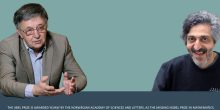Before the summer break we interviewed together with Raf Bocklandt mathematicians David Aldous and László Lovász.
David Aldous is an emeritus professor in the statistics department in the University of California at Berkley. On the 6th of April David Aldous received the Brouwer Medal 2020 for his contributions to probability theory. László Lovász is currently an emeritus professor at Eötvös Loránd University in Budapest and received on the 17th of March, together with Avi Wigderson, the Abel prize. To celebrate both occassions and to personally congratulate both of them we decided to contact them and ask them if they would have time for an interview with us. And their response was positive!
In this short blog post I want to discuss the process of writing down the interviews, which I found fascinating (links to the interviews can be found at the end of this post). I believe that an interview is a very unique form of communicating someone's work or opinions. In an interview you can write down the exact words of the interviewee making the article much more personal. Moreover, something that I really like in an interview is that you can marge the professional achievements and the personal story that accompanies most of someone's achievements.
The aim we had in both interviews was to give a so representative possible description of the scientific work of Professor Aldous and of Professor Lovász. At the same time we wanted to maintain a personal tone and also try to present some mathematical results proven by Aldous and Lovász in such a way that the readers could grasp the ideas behind the proofs. Which means that a suitably chosen result should be worked out and presented with the right amount of details. A technical result, that ourselves may not be very familiar with, didn't seem like a suitable candidate. At the same time we wanted to present a result for which we could persuade the reader of its validity without having to present all the technicalities of the formal proof.
A rule of thump, that I personally endeavor and try to apply when writing an article, is that the examples or results discussed should be such that they don't exactly match what the reader already knows, but they just go one step further of what they already know. In this way readers can relate easier to this new piece of mathematics which is new, but close to their sphere of knowledge. This hopefully motivates a reader to take a pen and a piece of paper and try to verify the mathematics. In the end, it is much more motivating to climb a tree and to grab a tasty fruit when the tree is not too high or too dangerous.
You can read the interview with David Aldous here and the interview with László Lovász here. Both were written for and published in the september issue of the Dutch mathematics magazine Nieuw Archief voor Wiskunde.




